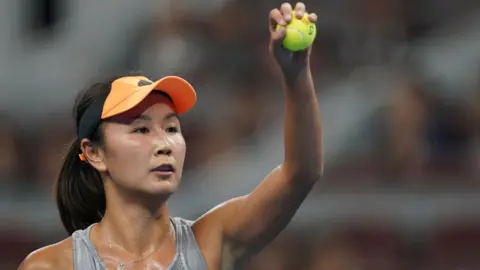Australian Open: Navratilova blasts Peng Shuai T-shirt ban
 Getty Images
Getty ImagesRetired tennis star Martina Navratilova has blasted a decision by Australian Open organisers to ban T-shirts supporting Chinese player Peng Shuai.
Security staff had on Friday asked spectators trying to enter the grounds to remove T-shirts saying "Where is Peng Shuai?".
Ms Peng disappeared for weeks after accusing a top Chinese official of sexual misconduct in November.
She has since re-appeared, but many remain concerned about her wellbeing.
Tennis Australia, the organising body behind the Australian Open, said Peng Shuai's safety remained their "primary concern", but defended their decision to confiscate the T-shirt and banner in a statement.
"Under our ticket conditions of entry, we don't allow clothing, banners or signs that are commercial or political," it said.
In a tweet, former world female number one tennis player Navratilova called the decision "pathetic."
Allow X content?

French tennis player Nicolas Mahut also chimed in on the incident, suggesting that organisers were bowing to pressure from major corporate Chinese sponsors.
Chinese premium liquor company Luzhou Laojiao and mattress firm DeRucci are listed as two of the leading partners on Australia Open's website.
"What's going on!? What lack of courage! What if you did not have Chinese sponsors?" Mr Mahut tweeted.
Australia researcher for international rights group Human Rights Watch, Sophie McNeill, called Tennis Australia's decision "not cool," and urged other tennis players in the tournament to bring attention to Peng Shuai.
Allow X content?

Friday's incident also sparked the creation of a Gofundme page that promised to print out more T-shirts after reaching its AUD$10,000 (£5,296; $7,179) goal.
It is common for international sport events to have policies on what organisers deem as political statements. Wimbledon prohibits "any objects or clothing bearing... political statements, objectionable or offensive statements" from the tournament grounds.
In November, Ms Peng posted a 1,600-word note on Chinese social media platform Weibo, accusing former Vice-Premier Zhang Gaoli of forcing her to have sex with him.
She then vanished from the public eye, triggering a wave of global concern among the international tennis community, fans and human rights groups over her whereabouts.
She resurfaced weeks later, and in her first media interview in December following her reappearance, she denied making any accusations of sexual assault and claimed her social media post had faced "a lot of misunderstandings".
